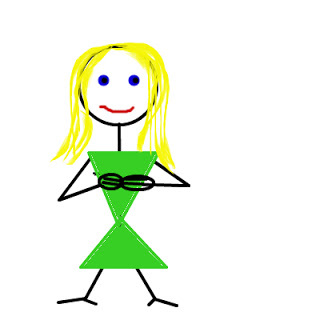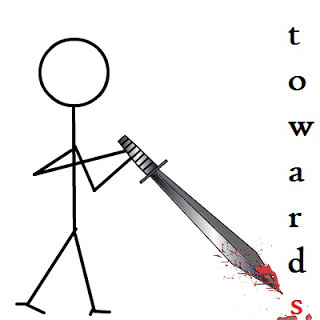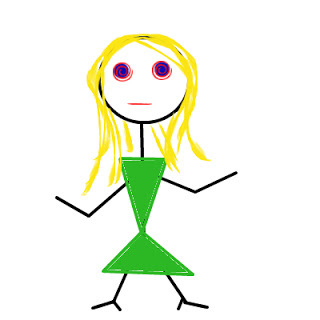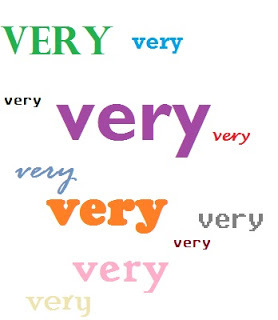Jade Varden's Blog, page 12
June 23, 2015
Writing 101: Being a Sadist
Have you ever tortured a man until he broke down and cried? Killed a person and watched them die? You have if you’re like a lot of authors, because sometimes being a writer means being a sadist. If you write books, you’re going to end up doing a lot of terrible things -- all on the page, of course.

Sadistic
Characters in books start to feel a little like friends, don’t they? I know Anne Shirley well. I would feel totally at home sitting with her in a turn-of-the-century Canadian kitchen, drinking raspberry cordial. For authors who create those characters, the connection is even stronger. And it’s really hard to make terrible things happen to those characters, to allow those characters to feel the pain of it all. But you have to. When you’re writing, you need to get sadistic. It isn’t going to be easy. Most people don’t like watching other people cry, and most people don’t really want to inflict pain upon others. So when you're killing a character, it’s going to get sad. You might start thinking about how you can't write for that character anymore. You may even start to feel empathy for the readers, and start to worrying about them. I do that.
You’ve got to push all that aside. It’s okay if you’re crying all over the keys while you’re writing. I do that, too. But you’ve got your outline. You’ve got your plan. You know why this terrible thing has to happen, and you have to make it happen. So put characters in pain, and make them feel it. Record it all on the page, and be sadistic. After it’s written, it’s done. Now you’re on to the next scene.

Sadistic
Characters in books start to feel a little like friends, don’t they? I know Anne Shirley well. I would feel totally at home sitting with her in a turn-of-the-century Canadian kitchen, drinking raspberry cordial. For authors who create those characters, the connection is even stronger. And it’s really hard to make terrible things happen to those characters, to allow those characters to feel the pain of it all. But you have to. When you’re writing, you need to get sadistic. It isn’t going to be easy. Most people don’t like watching other people cry, and most people don’t really want to inflict pain upon others. So when you're killing a character, it’s going to get sad. You might start thinking about how you can't write for that character anymore. You may even start to feel empathy for the readers, and start to worrying about them. I do that.
You’ve got to push all that aside. It’s okay if you’re crying all over the keys while you’re writing. I do that, too. But you’ve got your outline. You’ve got your plan. You know why this terrible thing has to happen, and you have to make it happen. So put characters in pain, and make them feel it. Record it all on the page, and be sadistic. After it’s written, it’s done. Now you’re on to the next scene.
Published on June 23, 2015 05:30
June 22, 2015
The Other 57 Books That Charles Dickens Wrote
Great Expectations. Oliver Twist. A Christmas Carol. Charles Dickens was clearly an incredible author, and everyone can name one or two of his books because people are still reading them. But here’s a little secret about old Chucky the Brit: he wrote 20 novels. With the possible exception of Jeopardy champ Ken Jennings, I’m pretty sure no one can name them all -- and even more certain that only a handful of people have actually read them all. Charles Dickens wrote lots of other books besides David Copperfield.

Saturation
In the days of Charles Dickens, there was no automatic spell checker. The typewriter wasn’t invented until the very end of his life, which means he was writing out his novels by hand. That makes his 20 novels highly impressive indeed, though not all of them have been big hits. Charles Dickens tried a technique that’s used in advertising all the time: saturation.
Dickens wrote a lot of books, and managed to sell a lot of them, too. He’s famous to this day, and he’s actually still selling books. Saturation is a trick that still works for authors, but writing 20 books these days probably won’t be enough.
Some of the most successful indie authors have conquered the book market by offering lots of new content all the time. They are constantly publishing new books to keep their audience engaged, and it works. In the self-publishing game, the more you publish the more you’re likely to sell.
So start borrowing from Charles Dickens, and saturate the market. Maybe you’ll write 15 books that no one has really heard of 50 years from now...but it’s the other 5 that make all the difference, anyway.

Saturation
In the days of Charles Dickens, there was no automatic spell checker. The typewriter wasn’t invented until the very end of his life, which means he was writing out his novels by hand. That makes his 20 novels highly impressive indeed, though not all of them have been big hits. Charles Dickens tried a technique that’s used in advertising all the time: saturation.
Dickens wrote a lot of books, and managed to sell a lot of them, too. He’s famous to this day, and he’s actually still selling books. Saturation is a trick that still works for authors, but writing 20 books these days probably won’t be enough.
Some of the most successful indie authors have conquered the book market by offering lots of new content all the time. They are constantly publishing new books to keep their audience engaged, and it works. In the self-publishing game, the more you publish the more you’re likely to sell.
So start borrowing from Charles Dickens, and saturate the market. Maybe you’ll write 15 books that no one has really heard of 50 years from now...but it’s the other 5 that make all the difference, anyway.
Published on June 22, 2015 05:30
June 18, 2015
Writing 101 Redux: Toward vs. Towards
Should you be moving toward your dreams, or towards them? Today's Throwback Thursday Writing 101 will answer that question conclusively.


Published on June 18, 2015 05:30
June 17, 2015
Writing 101: Confessions of an Absentee Author
In a perfect world, I would write every word of my books from the proper typing position, in a comfortable room all alone. I would have an endless supply of coffee and Mountain Dew. And I would type on my laptop, watching the story unfold before my very eyes. This is not how I write my books. I’m about to tell you the truth of how I manage to write books while working an 80-workweek. The truth is, I almost never type books on my laptop. These are the confessions of an absentee author.

To Tell the Truth
Last Thursday, I worked for 16 hours straight. I do mean straight. I don’t take breaks to eat, because clearly I haven’t got the time for that nonsense. I eat one-handed and drive the mouse with the other so I can still get some work done. The Wednesday before last Thursday, I worked for almost 14 hours. Every day, I work all day. When I get finished, I want to sleep. It would be ideal if I could just go ahead and crash then and there with the laptop still on top of me. That way, when I wake up I can just get right back to it. But that’s not very practical, because I still have to brush my teeth. So I don’t go immediately to sleep when I finish working. I may have to fold laundry or clean something up. I’ve got to wash my face and floss. And here is where I find the time to write my books. If you can call it that.
Sometimes, it only takes one hand to fold the laundry (you need a flat surface to work with, however, that’s important), and I have an electric toothbrush. This means I only need one hand to do that as well. So while I am doing these other tasks that must be done, I write books. This is not an ideal situation. I can’t stress that enough. But it’s what I’ve got to work with, and I don’t know any authors who are in an ideal situation of any sort. When you’re an indie and you’ve got to write and you’re going to write, you find ways to make the craziest things work. And I can probably help you with that.
For starters, I keep my books in clouds. I do this so that I may access these files from any device at any time. If my tablet’s losing power, I can pull the same manuscript right up on my phone. It fits quite nicely behind the faucet when I’m brushing my teeth, though the plumbing does make it hard to type. Keeping my files in the clouds allows me to get some writing done if I’m standing in line, waiting for my name to be called at the doctor’s office, or whatever. I fill up any free moment with writing, and in this way slowly eke out books.
There are lots of ways to make writing work, if you’re creative and you’re determined. These are two qualities that all authors must have just to get to the end of the manuscript, so I’m sure that you’ve got them, too.

To Tell the Truth
Last Thursday, I worked for 16 hours straight. I do mean straight. I don’t take breaks to eat, because clearly I haven’t got the time for that nonsense. I eat one-handed and drive the mouse with the other so I can still get some work done. The Wednesday before last Thursday, I worked for almost 14 hours. Every day, I work all day. When I get finished, I want to sleep. It would be ideal if I could just go ahead and crash then and there with the laptop still on top of me. That way, when I wake up I can just get right back to it. But that’s not very practical, because I still have to brush my teeth. So I don’t go immediately to sleep when I finish working. I may have to fold laundry or clean something up. I’ve got to wash my face and floss. And here is where I find the time to write my books. If you can call it that.
Sometimes, it only takes one hand to fold the laundry (you need a flat surface to work with, however, that’s important), and I have an electric toothbrush. This means I only need one hand to do that as well. So while I am doing these other tasks that must be done, I write books. This is not an ideal situation. I can’t stress that enough. But it’s what I’ve got to work with, and I don’t know any authors who are in an ideal situation of any sort. When you’re an indie and you’ve got to write and you’re going to write, you find ways to make the craziest things work. And I can probably help you with that.
For starters, I keep my books in clouds. I do this so that I may access these files from any device at any time. If my tablet’s losing power, I can pull the same manuscript right up on my phone. It fits quite nicely behind the faucet when I’m brushing my teeth, though the plumbing does make it hard to type. Keeping my files in the clouds allows me to get some writing done if I’m standing in line, waiting for my name to be called at the doctor’s office, or whatever. I fill up any free moment with writing, and in this way slowly eke out books.
There are lots of ways to make writing work, if you’re creative and you’re determined. These are two qualities that all authors must have just to get to the end of the manuscript, so I’m sure that you’ve got them, too.
Published on June 17, 2015 05:30
June 16, 2015
Writing 101: Focus
When you want to write a book, it really helps if you’ve got a good vocabulary. You’re going to need something to write on, and I recommend a lightweight laptop with a full-sized keyboard. It’s always useful to have a good imagination, to have the ability to visualize and picture things. But it is absolutely essential that you have one ingredient, or you will never, ever, ever finish that book: focus.

What’s That Over There?
Seriously, the other stuff can be dealt with. You can buy a thesaurus, right? You can learn typing techniques. Heck, there are classes online for free that teach technique. It’s even possible to improve your imagination. The more you use it, the more it works. Focus...that’s something that you either have, or don’t. And lately, I don’t have it. Do you?
To have focus, you’ve got to have the ability to concentrate on one thing and one thing only. If your mind is wandering, if you’re staring at the TV, if you’re thinking about something else, you’re not focused. And you can’t possibly write at your best if your mind isn’t totally committed to the story. You can’t keep 5 percent of your focus somewhere else. You can't be listening for the phone with half your mind while you write. You’ve got to focus totally on the world that’s on the page.
It’s one of the hardest aspects of being a writer. But if you can expand your vocabulary by learning new works, and flex your imagination by practicing often, then you can train yourself to focus. At least, I really hope that it is.
There’s a certain form of therapy where the person being treated sits in a darkened, soundless room. It has something to do with avoiding stimulation of all types. The point is, you can use a similar approach to force yourself to focus. Turn off the television, the Internet radio and the telephone. Turn your devices on silent mode. Now, write. If the story is the only thing in the room with you, it’s going to be much easier to focus on that and only that. Get yourself into the habit of getting focused on the story, and slowly start learning how to focus when there are other stimuli around you. Force yourself to focus, and you’ll be training yourself how to do it.

What’s That Over There?
Seriously, the other stuff can be dealt with. You can buy a thesaurus, right? You can learn typing techniques. Heck, there are classes online for free that teach technique. It’s even possible to improve your imagination. The more you use it, the more it works. Focus...that’s something that you either have, or don’t. And lately, I don’t have it. Do you?
To have focus, you’ve got to have the ability to concentrate on one thing and one thing only. If your mind is wandering, if you’re staring at the TV, if you’re thinking about something else, you’re not focused. And you can’t possibly write at your best if your mind isn’t totally committed to the story. You can’t keep 5 percent of your focus somewhere else. You can't be listening for the phone with half your mind while you write. You’ve got to focus totally on the world that’s on the page.
It’s one of the hardest aspects of being a writer. But if you can expand your vocabulary by learning new works, and flex your imagination by practicing often, then you can train yourself to focus. At least, I really hope that it is.
There’s a certain form of therapy where the person being treated sits in a darkened, soundless room. It has something to do with avoiding stimulation of all types. The point is, you can use a similar approach to force yourself to focus. Turn off the television, the Internet radio and the telephone. Turn your devices on silent mode. Now, write. If the story is the only thing in the room with you, it’s going to be much easier to focus on that and only that. Get yourself into the habit of getting focused on the story, and slowly start learning how to focus when there are other stimuli around you. Force yourself to focus, and you’ll be training yourself how to do it.
Published on June 16, 2015 05:30
June 15, 2015
It’s Really Easy to Hate Nicholas Sparks
Sure, I enjoyed "A Walk to Remember," like everyone else. But by the time "The Best of Me" came to theaters, I was thoroughly disgusted. It's really easy to hate Nicholas Sparks...and I do.

Author, Author
Please, don’t bombard me with emails. I know all of you love “The Notebook,” and yes I have seen the film also. But sometimes, I feel a little bit like Nicholas Sparks is writing the same book over and over. In fact, I’ve noticed that lots of authors are writing the same books over and over.Some authors follow a formula because that’s what works for them. Let’s start with our first example, one Mr. Sparks. Here’s the formula: there’s a girl, and a guy. They’re both flawed, but they totally fall in love anyway. Something rips them apart, and it’s awful, but the love is still there. Some stuff happens, and finally their love triumphs over it. Yay. Add a bunch of love and romance and heartache and yearning, and you’ve got a best-selling book.
Nicholas Sparks isn’t the only author who follows a strict formula. Stephen King does pretty much the same thing, only you substitute the love for some sort of monster. Maybe it’s a car, maybe it’s a dude who’s going crazy, hell in one book it was scary fog. That’s real, go look it up.
James Patterson is another perfect example of a formulaic author. He introduces a crime, a person committing the crime and someone who’s trying to solve the crime. It all gets mixed together so the person solving the crime (and you, the reader) can sort it out. And at the end of the book, it is sorted out. Again, yay.
It’s really easy to hate these successful, highly formulaic authors....because it’s impossible not to envy them. Not only can they write one book that hits big, they can somehow keep writing the same book and still hitting it big. Isn’t that aggravating?
But obviously, their formula works. They’ve figured out what people want to read, so they change a few names around and introduce a different obstacle and now it looks like a different story. So instead of hating Nicholas Sparks, which I can assure you takes a great deal of energy, try to find the formula that’s going to work for you. Following a pattern helps authors get more work done (obviously, since some new Nicholas Sparks movie is coming to theaters every other month), and it might work for you, too. So don’t hate the players. Just start playing their game.

Author, Author
Please, don’t bombard me with emails. I know all of you love “The Notebook,” and yes I have seen the film also. But sometimes, I feel a little bit like Nicholas Sparks is writing the same book over and over. In fact, I’ve noticed that lots of authors are writing the same books over and over.Some authors follow a formula because that’s what works for them. Let’s start with our first example, one Mr. Sparks. Here’s the formula: there’s a girl, and a guy. They’re both flawed, but they totally fall in love anyway. Something rips them apart, and it’s awful, but the love is still there. Some stuff happens, and finally their love triumphs over it. Yay. Add a bunch of love and romance and heartache and yearning, and you’ve got a best-selling book.
Nicholas Sparks isn’t the only author who follows a strict formula. Stephen King does pretty much the same thing, only you substitute the love for some sort of monster. Maybe it’s a car, maybe it’s a dude who’s going crazy, hell in one book it was scary fog. That’s real, go look it up.
James Patterson is another perfect example of a formulaic author. He introduces a crime, a person committing the crime and someone who’s trying to solve the crime. It all gets mixed together so the person solving the crime (and you, the reader) can sort it out. And at the end of the book, it is sorted out. Again, yay.
It’s really easy to hate these successful, highly formulaic authors....because it’s impossible not to envy them. Not only can they write one book that hits big, they can somehow keep writing the same book and still hitting it big. Isn’t that aggravating?
But obviously, their formula works. They’ve figured out what people want to read, so they change a few names around and introduce a different obstacle and now it looks like a different story. So instead of hating Nicholas Sparks, which I can assure you takes a great deal of energy, try to find the formula that’s going to work for you. Following a pattern helps authors get more work done (obviously, since some new Nicholas Sparks movie is coming to theaters every other month), and it might work for you, too. So don’t hate the players. Just start playing their game.
Published on June 15, 2015 05:30
June 11, 2015
Writing 101 Redux: It's Very Easy to Over-Use Very
The word very doesn't really lend anything to your writing. In fact, some authors will tell you not to use the word at all. Find out what you should do about very in today's TBT Writing 101.

This Throwback Thursday post will tell you exactly what to do about very, and where it belongs in your writing.

This Throwback Thursday post will tell you exactly what to do about very, and where it belongs in your writing.
Published on June 11, 2015 05:30
June 10, 2015
Writing 101: What Do You Know About Insanity?
At some point, you may want to write a murder mystery, or just insert a murder into your story. You may need to have a character behave in a way that’s inexplicable, or less than normal. You may need to write a character who’s crazy. But what do you know about insanity?

Crazy is as Crazy Does
To simply write a character who is “crazy” is going to feel unsatisfying. Being crazy is a motive for killing someone or running around the street naked and screaming, or doing other things that just plain don’t make sense. But it’s not an explanation, and your readers are going to crave an explanation. How is this character crazy? Why are they insane? Because what you have to remember is this: the character doesn’t know they are insane. To them, everything they are doing makes perfect sense. So before you write it, you have to get inside of their crazy.
Are you ready to make yourself insane? Because if you’re going to write crazy, you need to know it.
Please, don’t go commit a murder so you may more accurately write about it. No one’s suggesting that, and I don’t want to get involved in any investigations. But it’s fine for you to imagine a killing, and to think about the motivation that might put someone in a dark enough place to actually carry out these horrible actions. Because there really is no such thing as simply “crazy” or insane. No one is those things. But people do have illnesses and personality disorders that can make them behave in ways that other people don’t understand. As the author, it’s part of your job to make them understand just why those crazy characters of yours are crazy in the first place.
So do a little research into insanity, and I don’t mean to do it by driving yourself insane. Look up the characteristics of personality disorders and mental illnesses. What does it take to become a killer? What personality types commit murders that don’t seem to make much sense? Give yourself a very basic understanding of mood disorders, like schizophrenia and narcissism. Because even the smallest characters in your book have to feel like real people.
And here’s a secret about the characters in your book: the small characters don’t know they’re small. Every character thinks they are really the star of the story, and that’s how they’re going to behave because that’s how real people behave. Real people may have a little bit of insanity mixed into their brains, and that’s okay. Learn more about what makes real people tick, and you’ll learn how to write much more believable characters.

Crazy is as Crazy Does
To simply write a character who is “crazy” is going to feel unsatisfying. Being crazy is a motive for killing someone or running around the street naked and screaming, or doing other things that just plain don’t make sense. But it’s not an explanation, and your readers are going to crave an explanation. How is this character crazy? Why are they insane? Because what you have to remember is this: the character doesn’t know they are insane. To them, everything they are doing makes perfect sense. So before you write it, you have to get inside of their crazy.
Are you ready to make yourself insane? Because if you’re going to write crazy, you need to know it.
Please, don’t go commit a murder so you may more accurately write about it. No one’s suggesting that, and I don’t want to get involved in any investigations. But it’s fine for you to imagine a killing, and to think about the motivation that might put someone in a dark enough place to actually carry out these horrible actions. Because there really is no such thing as simply “crazy” or insane. No one is those things. But people do have illnesses and personality disorders that can make them behave in ways that other people don’t understand. As the author, it’s part of your job to make them understand just why those crazy characters of yours are crazy in the first place.
So do a little research into insanity, and I don’t mean to do it by driving yourself insane. Look up the characteristics of personality disorders and mental illnesses. What does it take to become a killer? What personality types commit murders that don’t seem to make much sense? Give yourself a very basic understanding of mood disorders, like schizophrenia and narcissism. Because even the smallest characters in your book have to feel like real people.
And here’s a secret about the characters in your book: the small characters don’t know they’re small. Every character thinks they are really the star of the story, and that’s how they’re going to behave because that’s how real people behave. Real people may have a little bit of insanity mixed into their brains, and that’s okay. Learn more about what makes real people tick, and you’ll learn how to write much more believable characters.
Published on June 10, 2015 05:30
June 9, 2015
Writing 101: You, and Your Writing Environment
I've always said that writers have to know how to tune out the world if they're going to get anything done. You have to know how to write in a noisy room, in crowded rooms in a house with pets running around and people underfoot. Your writing environment may be imperfect, but a writer soldiers on. But it has come to my attention recently that you can learn how to shut out the world, ignore those other people at Starbucks, pretend the phone isn't ringing and stay away from Twitter for one more hour...and still struggle in your writing environment. The most important space you will ever work in is your own head space. And if that space isn't right, nothing will be.

Check Your Head
Every book you will ever write is inside your head. You have to pull it out of your brain, word by word, and sometimes it's painful. Sometimes it's difficult. Sometimes you've got phones ringing and stereos blasting and cats screeching. And sometimes, you won't. You could have a perfectly silent room with blank walls and a big desk to write behind with no distractions whatsoever, and you can still be unable to pull those words out of your brain. Because sometimes, it's your own head that's too noisy, and cramped,and cluttered...and messy. This is the writing environment you need to control. And of course, it's the hardest one you'll ever have to control.
Writers have to be introverts. Even a writer who is naturally outgoing has to learn how to shift focus inward, how to dwell inside the imagination. That's why we have to know how to make the world fade away when you're really into the story you're telling, the world will fade...until it's only you, and the world on the page. At least,that's what happens when things are going the way they should. When your head space is over-crowded, all bets are off. And all words are harder to find.
A book got to me, once. I thought it was the greatest book I had ever written, and would ever write, and maybe it was. No one, however, will read it. Because that book got to me, and it took up all the spare space I had in my head. It made me think about it, about it and nothing else, for much longer than I care to admit. It kept me from writing any other story -- and, my! How I tried -- for an appallingly long time.
And no, to answer the question, I'm not over it yet. I thought about that book yesterday, and the day before, and the day before that and I could go on. I think about that book, but not for long. That's the big trick. I think of it, I feel what I feel, and then I put those thoughts away. I'll give myself a minute, maybe five, but no more. Otherwise, I'll find myself sitting and staring at blank screens again, and I did that for long enough.
Control your head space. Think about what’s bothering you, and then try to put it away so you can get back to the page. You and your writing environment matter very much to each other, so do what you need to do to keep yours uncluttered and easy to work in.

Check Your Head
Every book you will ever write is inside your head. You have to pull it out of your brain, word by word, and sometimes it's painful. Sometimes it's difficult. Sometimes you've got phones ringing and stereos blasting and cats screeching. And sometimes, you won't. You could have a perfectly silent room with blank walls and a big desk to write behind with no distractions whatsoever, and you can still be unable to pull those words out of your brain. Because sometimes, it's your own head that's too noisy, and cramped,and cluttered...and messy. This is the writing environment you need to control. And of course, it's the hardest one you'll ever have to control.
Writers have to be introverts. Even a writer who is naturally outgoing has to learn how to shift focus inward, how to dwell inside the imagination. That's why we have to know how to make the world fade away when you're really into the story you're telling, the world will fade...until it's only you, and the world on the page. At least,that's what happens when things are going the way they should. When your head space is over-crowded, all bets are off. And all words are harder to find.
A book got to me, once. I thought it was the greatest book I had ever written, and would ever write, and maybe it was. No one, however, will read it. Because that book got to me, and it took up all the spare space I had in my head. It made me think about it, about it and nothing else, for much longer than I care to admit. It kept me from writing any other story -- and, my! How I tried -- for an appallingly long time.
And no, to answer the question, I'm not over it yet. I thought about that book yesterday, and the day before, and the day before that and I could go on. I think about that book, but not for long. That's the big trick. I think of it, I feel what I feel, and then I put those thoughts away. I'll give myself a minute, maybe five, but no more. Otherwise, I'll find myself sitting and staring at blank screens again, and I did that for long enough.
Control your head space. Think about what’s bothering you, and then try to put it away so you can get back to the page. You and your writing environment matter very much to each other, so do what you need to do to keep yours uncluttered and easy to work in.
Published on June 09, 2015 05:30
June 8, 2015
Why You Can’t Be Margaret Mitchell Anymore
I always thought that Margaret Mitchell had a pretty sweet gig. Raised in the south, like another author we know, Margaret Mitchell wrote about the stories that she heard growing up. She wrote "Gone With the Wind," and that turned out to be the only book she needed to write. Margaret Mitchell never wrote another one. But I can't be her, and neither can you. Authors can't just write one book anymore. And if Margaret Mitchell was around today, she wouldn't be able to, either.

One Book Wonders
Lots of authors actually do write just one book, but you don't know who those people are. Most of them don't spend the rest of their lives reading fan mail and turning down interview requests. For the most part, authors who write just one book simply fade away. A rare few are remembered...or at least, they were.
Emily Bronte wrote a book that I personally don't like, and those who read my books will find more than one reference to it if you go looking, but lots of other people totally love it. She died shortly after "Wuthering Heights," and never saw it become a success. The rest of the world did, however, and now school children are forced to read her words. Her name is remembers, and t appeared on just one book jacket.
Anna Sewell also died shortly after her one and only book, "Black Beauty." She was sickly as a child and broke both her ankles. Because it was hard for her to get around, she rode in a horse and carriage. This is where she developed a love of horses, and why she wrote "Black beauty."
JD Salinger wrote many short stories, and people consider him to be a prolific writer, but he only ever wrote one full-length novel. “Catcher in the Rye” has gained a certain level of notoriety among conspiracy theorists because of its involvement in the John Lennon assassination. Maybe that’s why Salinger never wrote another book. He lived to be 91.
But it doesn’t really work like this anymore. Most authors just can’t get away with writing one book, even if it’s a great book. What if Stephenie Meyer had stopped at “Twilight,” or there was just one “Divergent?” Can you image a single “Harry Potter” or a world without 900 “Pretty Little Liars” books? On that, I may be inaccurate about the 900 PLL books. That estimate seems way too low.
The point is, one book can get you noticed and that’s great. But today’s authors are expected to write more than that. Constant interaction with fans and continuous engagement are how today’s authors are expected to behave.
So, I must put away my hoop skirt and hang the curtains back over the windows. If I can’t be Margaret Mitchell, I’ll have to figure out how to be the author that I am...and you will, too.

One Book Wonders
Lots of authors actually do write just one book, but you don't know who those people are. Most of them don't spend the rest of their lives reading fan mail and turning down interview requests. For the most part, authors who write just one book simply fade away. A rare few are remembered...or at least, they were.
Emily Bronte wrote a book that I personally don't like, and those who read my books will find more than one reference to it if you go looking, but lots of other people totally love it. She died shortly after "Wuthering Heights," and never saw it become a success. The rest of the world did, however, and now school children are forced to read her words. Her name is remembers, and t appeared on just one book jacket.
Anna Sewell also died shortly after her one and only book, "Black Beauty." She was sickly as a child and broke both her ankles. Because it was hard for her to get around, she rode in a horse and carriage. This is where she developed a love of horses, and why she wrote "Black beauty."
JD Salinger wrote many short stories, and people consider him to be a prolific writer, but he only ever wrote one full-length novel. “Catcher in the Rye” has gained a certain level of notoriety among conspiracy theorists because of its involvement in the John Lennon assassination. Maybe that’s why Salinger never wrote another book. He lived to be 91.
But it doesn’t really work like this anymore. Most authors just can’t get away with writing one book, even if it’s a great book. What if Stephenie Meyer had stopped at “Twilight,” or there was just one “Divergent?” Can you image a single “Harry Potter” or a world without 900 “Pretty Little Liars” books? On that, I may be inaccurate about the 900 PLL books. That estimate seems way too low.
The point is, one book can get you noticed and that’s great. But today’s authors are expected to write more than that. Constant interaction with fans and continuous engagement are how today’s authors are expected to behave.
So, I must put away my hoop skirt and hang the curtains back over the windows. If I can’t be Margaret Mitchell, I’ll have to figure out how to be the author that I am...and you will, too.
Published on June 08, 2015 05:30



